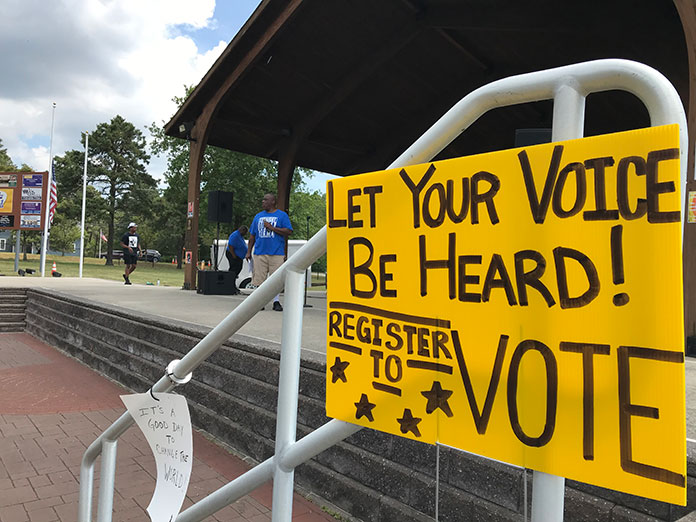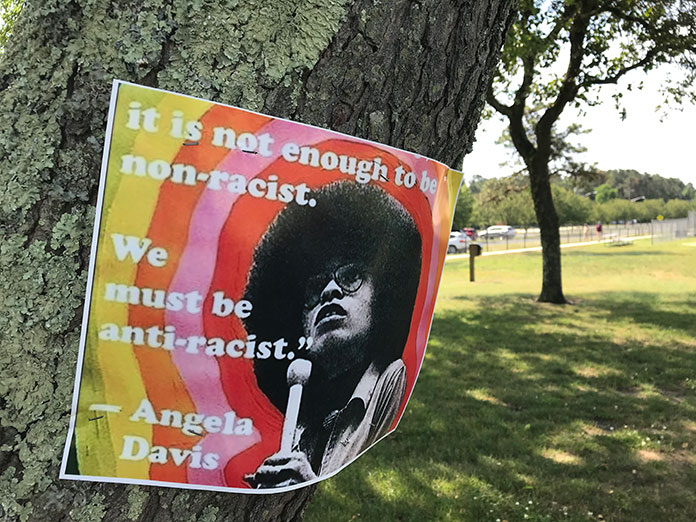
BERKELEY – Vote. Tell your story. Correct people when they are being racist. These were the lessons that community leaders were making at a unity rally at Veterans Park in Berkeley.
There were about 100 people at the gathering organized by local youth leader Robert Taylor. Both superintendents, several other educators, three members of the council, and some members of the South Toms River governing body were also in attendance. Police managed traffic and parking and mingled with the people gathered.
But the floor was yielded to the younger generation. It’s their job, Taylor said, to let their voices be heard. They need to vote (voter registration cards were available). And they need to bridge the gaps that are being made now.

Andrew Kelly was one of the first youth speakers. Taking part in some of Taylor’s basketball leagues, he said it’s more than just stats that bring people together.
“We’re a lot more similar than we’re led to believe,” he said.
Anthony Holloway, a young man, also said that we should be educating people even younger than him – little kids – so they learn early to treat everyone equal.
“We’re the greatest country in the world. Why do we have to be divided by color?” he asked.
Khaleel Greene talked about the challenges of talking to other people, but it’s still important to do.
“How do you make people feel the way you feel?” he said. “You got to talk to other people. You got to reach out even if they don’t listen.”
Shaniyah Taylor, Robert Taylor’s daughter, said that change doesn’t happen overnight. It’s not going to be two weeks of protests and everything’s fixed.

“If you’re not a person of color, we don’t expect you to feel our pain,” but to listen, she said.
She said that the man who killed George Floyd was a bad cop, but every police officer who doesn’t speak out is part of the problem, because silence breeds compliance.
People of color need to infiltrate the system and change it from within, she said.
The younger generation were some of the first to speak before it got handed over to educators like John and Kathy Tierney, who teach at Pinelands Regional. Kathy Tierney had brought the voter registration cards and urged people to vote for board of education members who want an inclusive curriculum, for example.
John Tierney, who is white, said he had never seen color when he talks to others. Black friends told him that’s not enough. “You have to have the uncomfortable conversations,” he was told. People have to understand their differences, without devaluing someone who is different. And these discussions can’t happen by yelling on Facebook but by having real talk between people.

Willie Jacobs, a teacher at Central Regional, and who had been a coach, said a lot of coaches just look at the physical traits of the athletes. How fast they can run or other traits. They don’t coach with an eye on that player’s future after high school. They’re not coaching what kind of person they are going to be, or what college or career they will go to.
He said he chose to teach at Central even though there were race issues in the past, and in his past. That was why he had to go there to be a positive movement between races.
“Don’t let anyone preach hate,” he said. “They want to divide us.”
There was a religious element to the ceremony as well.
Pastor Donnie Clyburn of Pathway of Life Ministries opened with a prayer and applauded the peaceful protests that have been going on. He also urged people to speak: speak out when something is wrong; speak to others who are not like you; grow so that our children’s children won’t have problems speaking to another human being.
Rev. David Graham from Holy Temple talked about being stationed in Hawaii. Years after Pearl Harbor, there were people who still had post-traumatic stress disorder from the event. And black people in America have PTSD from the ways they have been hurt.
But in order to heal that hurt, there must be forgiveness, he said. A lack of forgiveness causes pride, anger, stubbornness and a lack of joy.






